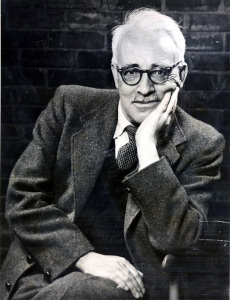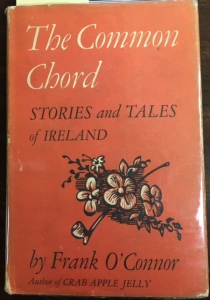It’s March, and our thoughts turn to things Irish. Well, some of them anyway. And Ireland is well represented in the Galvin Rare Book Room. From Behan to Yeats and rebels to kings, there’s a
bit of everything here.
One name that might not be as familiar to some is Frank O’Connor. He was born Michael Francis O’Donovan in 1903 to an alcoholic father and an abusive mother. At 15 he joined the Irish Republican Army and served in combat during the Irish War for Independence. He also joined the Anti-Treaty IRA during the Irish Civil War, working in a small propaganda unit in Cork City. Between 1922 and 1923 O’Connor was imprisoned in Cork City Gaol, where he studied languages, read, and wrote.
After his release, he took many jobs including a teacher of Irish, theatre director, and librarian. He began to move in literary circles where he came to know most of the including Yeats. In 1935 he joined the board of directors of the Abbey Theater (started by Yeats and other members of the Irish National Theatre Society) and in 1937 became its managing director. He spent most of the 1950’s teaching in the United States where his stories were quite popular.
Probably best known for his varied and comprehensive short stories but he is also known for his work as a literary critic, essayist, travel writer, translator, and biographer. He was also a novelist, poet and dramatist. Many of his writings were based on his own life experiences and wrote about his early years in An Only Child. Since 2000, The Munster Literature Centre in O’Connor’s hometown of Cork has run a festival dedicated to the short story form in O’Connor’s
name. The Frank O’Connor International Short Story Award is awarded to the best short fiction collection published in English anywhere in the world in the year preceding the festival.
The Rare Book Room’s volume is called, The Common Chord: stories and tales of Ireland, and is signed by the author. The description on the inside cover says: “The ‘common chord’ of the title is sex—but its treatment, while running a very wide range, never includes the suggestive or the obscene.” And through it all runs the lilt of Irish humor and wisdom.


